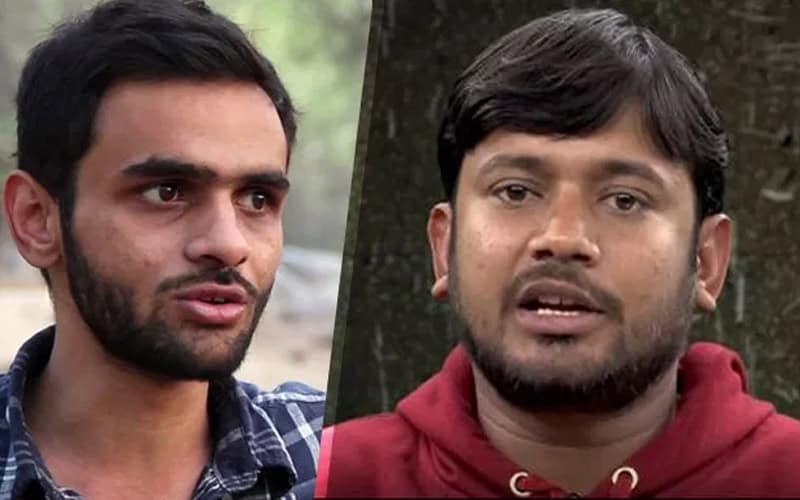NEW DLEHI: Delhi Police has claimed to have recovered communication between the then JNU Students Union president Kanhaiya Kumar and his associate Umar Khalid besides video footage to suggest “evidence” that they were part of a group of students who raised anti-national slogans during a protest event organised on the campus on February 9, 2016.
In the charge sheet filed in a court here yesterday, Delhi Police said there were video footages wherein Kanhaiya Kumar is “seen leading the students who were raising anti-national slogans” and that he had been identified by the witnesses in the videos.
“The location of mobile phone at the place of occurrence” was also cited as evidence against Kumar in the 1200-page charge sheet.
As part of other evidence, the police said the Forensic Science Laboratory had retrieved an SMS sent by Khalid to Kumar, asking him to “arrive at Sabarmati Dhaba, JNU, as their permission had been cancelled by the JNU administration.”
The Indian Computer Emergency Response Team (CERT-In) also recovered the pamphlet of the event from Khalid’s e-mail, the charge sheet said.
The recovered pamphlets bore the name of Umar Khalid, Kumar and Anirban Bhattacharya as the organisers of the event held on February 9, 2016, it added.
The chargesheet states: “The investigation exercise clearly establishes the fact that these two had exchanged the designs of the incriminating poster relating to Afzal Guru over emails. It is clear from these emails that Khalid and Anirban are speaking about ‘Azaadi of Kashmir’ from ‘occupation of India’ well before the programme to commemorate the execution of Guru. Slogans raised by both clearly go to show that they are trying to excite disaffection towards the idea of India and by advocating the terrorist acts committed by Guru and Maqbool Bhatt by glamorising them, and by calling them martyrs and freedom fighters of Kashmir. They were trying to incite hatred, contempt and disaffection towards the government established by law. The slogans like ‘Bharat tere tukde honge, Inshallah-inshallah’ and ‘Bharat ki barbadi tak jung rahegi, jung rahegi’ clearly indicate the nefarious and sinister objectives of this voice,” reported The Indian Express.
[also_read url=”https://archive.siasat.com/news/kanhaiya-kumar-questions-timing-chargesheet-says-its-politically-motivated-1456380/”]Kanhaiya Kumar questions timing of chargesheet, says it’s politically motivated[/also_read]
On February 9, 2016, “anti-national” slogans were allegedly raised in the JNU campus during a programme called to protest against the death sentence given to Afzal Guru, a convict in the 2002 Parliament attack.
The Delhi Police, in its charge sheet, named Kumar, Khalid, Bhattacharya and 7 other students, namely, Aquib Hussain, Mujeeb Hussain, Muneeb Hussain, Umar Gul, Rayeea Rasool, and Bashir Bhat. They have been charged with sedition and various other serious crimes.
The Patiala House Court on Tuesday deferred the matter till January 19 due to the absence of Chief Metropolitan Magistrate Deepak Sehrawat who was expected to take cognizance of the said chargesheet.
The police charge sheet said that during the investigation, the handwriting analysis proved that the accused had tried to deliberately disguise the investigating agency by concealing the nature and the flow of handwriting.
Delhi Police has also claimed to have recovered the original application for the event. Forensic experts claimed that while seeking the permission, Khalid had forged the signature of Anirban and Ashwith, the charge sheet said.
[also_read url=”https://archive.siasat.com/news/chargesheet-filed-against-kanhaiya-kumar-umar-khalid-jnu-event-case-1456335/”]Chargesheet filed against Kanhaiya Kumar, Umar Khalid in JNU event case[/also_read]
The chargesheet states: “The (Central Forensic Science Laboratory) expert also observed that the comparison of specimen writings marked S-1 to S-25 and admitted writings marked A-1 to A-13, both belonging to Khalid, reveal that they are not consistent with each other with respect to skill, speed, rhythm and line quality. This proves that the accused deliberately tried to disguise the investigating agency by concealing this natural flow of writing pattern.”
“Kanhaiya Kumar is seen by the eyewitness accompanying the procession of JNU Students forming unlawful assembly and raising anti-national slogans,” the charge sheet read.
The chargesheet also cites the statement of a senior security official of the varsity confirming that there was a gathering of 15-20 students who were raising anti-national slogans and also confirming the presence of Kumar during the protest.
The charge sheet said the presence of Kashmiri Students also was confirmed and that they were in contact with student leader Umar Khalid.
Aswathi is named in the column no. 12 of the charge sheet, stating that “sufficient evidence” to prove his involvement has not yet been gathered. This column also bears the name of Communist Party of India (CPI) leader D Raja’s daughter Aparajita Raja and former JNU vice-president Shehla Rashid.
With agency inputs

